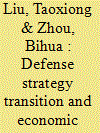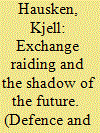|
|
|
Sort Order |
|
|
|
Items / Page
|
|
|
|
|
|
|
| Srl | Item |
| 1 |
ID:
139436


|
|
|
|
|
| Summary/Abstract |
Cambodia has recently demonstrated one of the highest rates of deforestation in the world. While scholars have long explored the drivers of tropical forest loss, the case of Cambodia offers particular insights into the role of the state where transnational governance and regional integration are increasingly the norm. Given the significant role logging rents play in Cambodia's post-conflict state formation, this article explores the contemporary regime and its ongoing codependent relationship with forested land. Insights are distilled from comparative analysis of illicit logging in two ethnographic case studies. Both involve foreign investments by state-owned companies – a Chinese-backed hydropower dam and Vietnamese-owned rubber concessions – and both are nestled in prominent conservation landscapes that are managed with international donor support. Together, the cases reveal how Cambodia's current timber extraction regime works through the use and abuse of legal mechanisms associated with forest conservation and foreign investment projects, and the mobilization of elite alliances that log both for private gain and in service of the ruling party's interests. By implication, the government's remarkable facilitation of transnational projects for conservation and development must be reappraised and ultimately seen as constitutive of a predatory and extractive regime that continues to rely heavily upon illicit logging revenues.
|
|
|
|
|
|
|
|
|
|
|
|
|
|
|
|
| 2 |
ID:
137931


|
|
|
|
|
| Summary/Abstract |
This paper develops a growth model for a country under a Hobbesian environment with international conflicts where national defense is the only way to prevent external predation. Different defense strategies result in different growth paths. The long-run growth path is determined by the equilibrium of a dynamic game with three players: the external predator, the government, and the family. The equilibrium growth path can have different phases: submissive equilibrium, tolerant equilibrium, and complete protection equilibrium. Sustainable growth will endogenously induce an adjustment of the defense strategies. As the economy keeps growing, complete protection will eventually be preferred. The optimal growth path prefers to compress the length of the transitional period between incomplete protection and complete protection. Some interesting features of the transitional dynamics are exhibited by a control model with discontinuity.
|
|
|
|
|
|
|
|
|
|
|
|
|
|
|
|
| 3 |
ID:
083229


|
|
|
|
|
| Publication |
2008.
|
| Summary/Abstract |
Abstract A two-period exchange model is developed where production decisions in the first period determine the amount of resources available in the second period. Each agent allocates resources to defend its production and attack the production of the other agent. Production, conflict and exchange occur simultaneously in a dynamic model. This extends earlier exchange models, which are static and preclude defense and appropriation. The agents jointly determine price through their export decisions. Upon introducing exchange endogenously, raiding in the first relative to the second period decreases with growth, appropriation cost, and when the future becomes more important, and increases with defense cost, production cost, and usability of appropriation. Increasing the usability of appropriation and defense cost causes a transition from pure exchange via joint exchange and raiding to pure raiding. This implies that agents gradually substitute from defense to appropriation, they exchange less, and utility decreases. Utility isoquants in a usability of appropriation versus discount factor diagram are concavely increasing for joint exchange and raiding, and can be convexly decreasing for pure raiding. Cobb-Douglas utilities are assumed. The results are confirmed with CES utilities
|
|
|
|
|
|
|
|
|
|
|
|
|
|
|
|
| 4 |
ID:
184184


|
|
|
|
|
| Summary/Abstract |
During civil wars, some communities raise self-defense militias to protect themselves from insurgent predation, but these militias can end up mutating into predatory organizations. The extant literature has focused chiefly on the predatory propensity of state-created self-defense militias and has mostly overlooked why some community-created self-defense militias segue into predatory organizations while others eschew predation altogether. This study explains this phenomenon, drawing on in-depth interviews with active members of two community-created self-defense militias (Ahlu Sunna Waljama’a and Macawiisley) in Somalia. In doing so, two sequential mechanisms (sponsorship and mobility) that determine the propensity of predatory behavior are introduced. Self-defense militias that conduct offensive operations engage in predatory behavior, irrespective of whether they are sponsored locally or have external patrons. Externally sponsored self-defense militias that engage in offensive operations attract opportunistic recruits and become motivated by material benefits, while community-sponsored self-defense militias that conduct offensive operations instrumentalize their position to settle old scores against rival communities. By contrast, self-defense militias that restrict their operations to defensive activities typically recruit dedicated homegrown members, and are regulated by community-managed accountability mechanisms that prevent predatory and abusive behavior. This community control remains crucial for defensive self-defense militias, who must balance external patrons’ strategic aims with their local objectives.
|
|
|
|
|
|
|
|
|
|
|
|
|
|
|
|
| 5 |
ID:
127122


|
|
|
|
|
| Publication |
2013.
|
| Summary/Abstract |
Two opposing land tenure policies are being implemented in upland Cambodia: indigenous communal title, the product of a decade of advocacy for indigenous rights; and Order 01, a dramatic new initiative to provide private individual titles to thousands of farmers living on state public land. This policy conflict has precipitated painful deliberations in Indigenous villages, whereby the merits of inalienable communal title must be weighed against its risks and constraints; and individual titles must be scrutinised for their potential to accelerate alienation and render frontier areas 'legible' for government and markets. I examine these issues through the experiences of one village in Mondulkiri, which recently 'reconciled' its communal title claim with the new individually motivated reforms. The village exemplifies Cambodia's commodity frontier: it is of mixed Bunong-Khmer ethnicity, and has undergone rapid deforestation and market integration since 2005. Thus, when the individual titling commenced in 2012, the already-fragile communal land claim was abandoned by 25% of its constituents. I explore how this unfolded, revealing powerful moral and racial narratives around Bunong identity and the processes of land fragmentation, commodification and alienation. I also reveal how these processes are enabled by Cambodia's predatory regime, of which Order 01 is an intimate part.
|
|
|
|
|
|
|
|
|
|
|
|
|
|
|
|
|
|
|
|
|